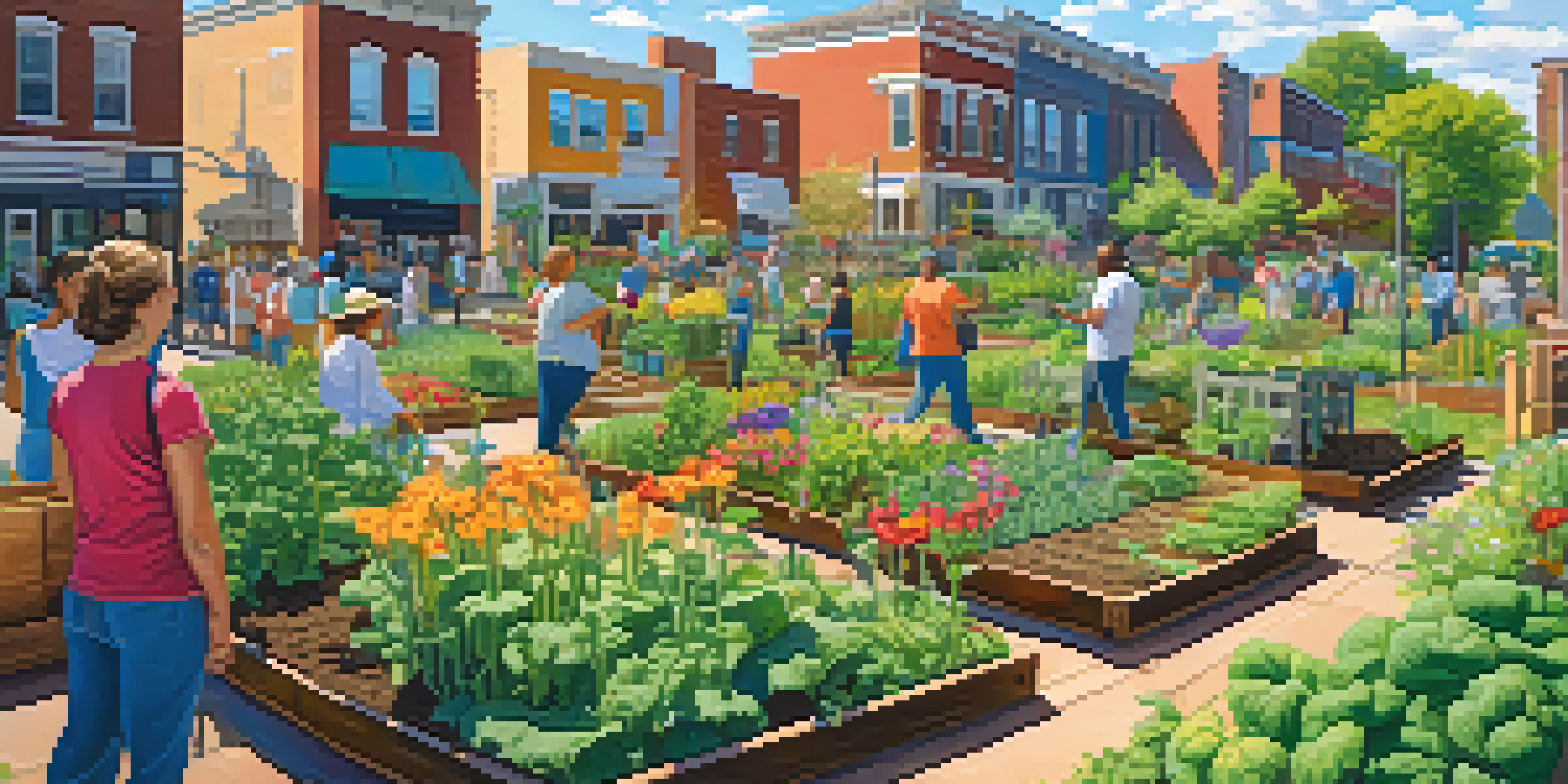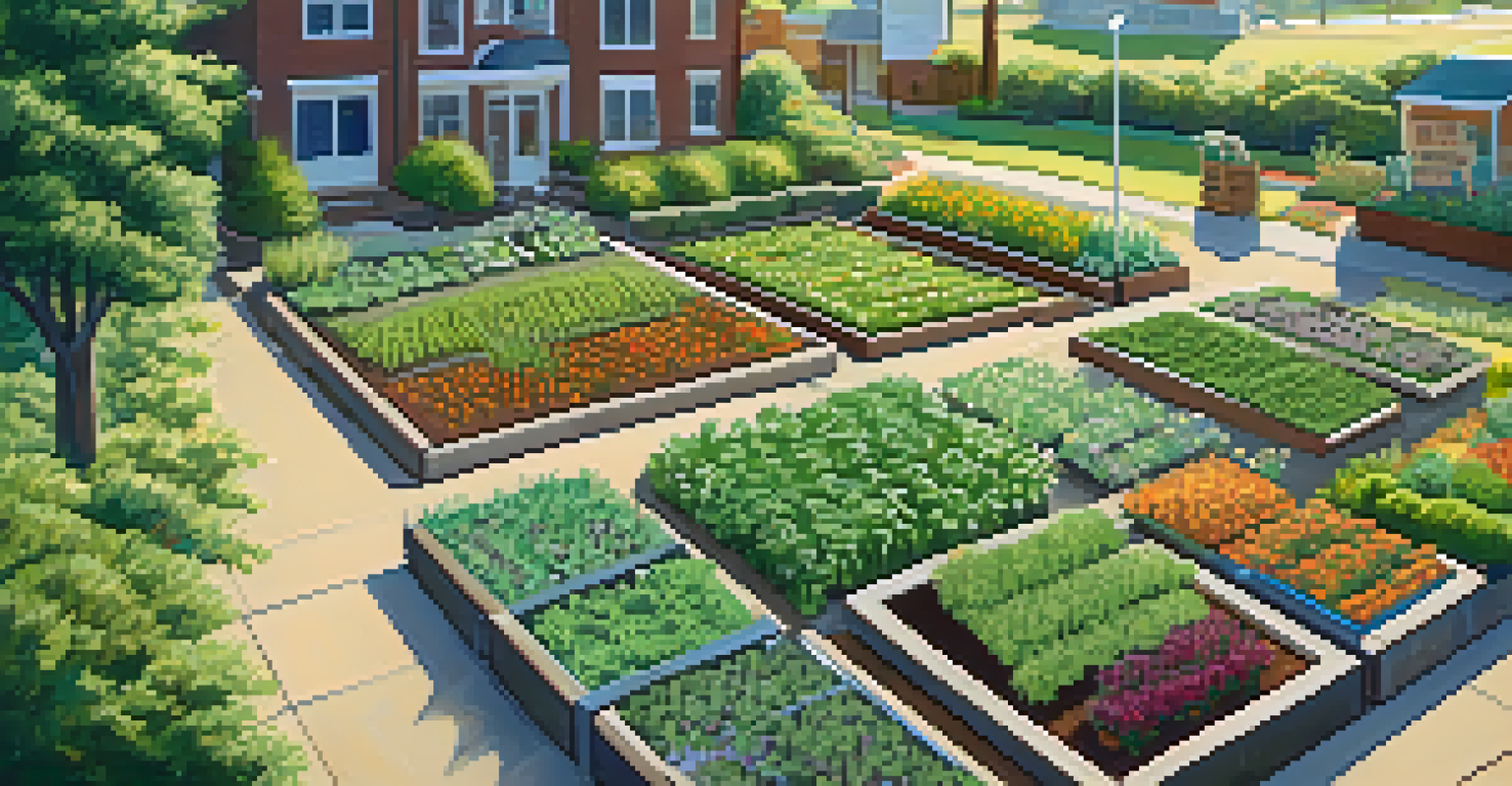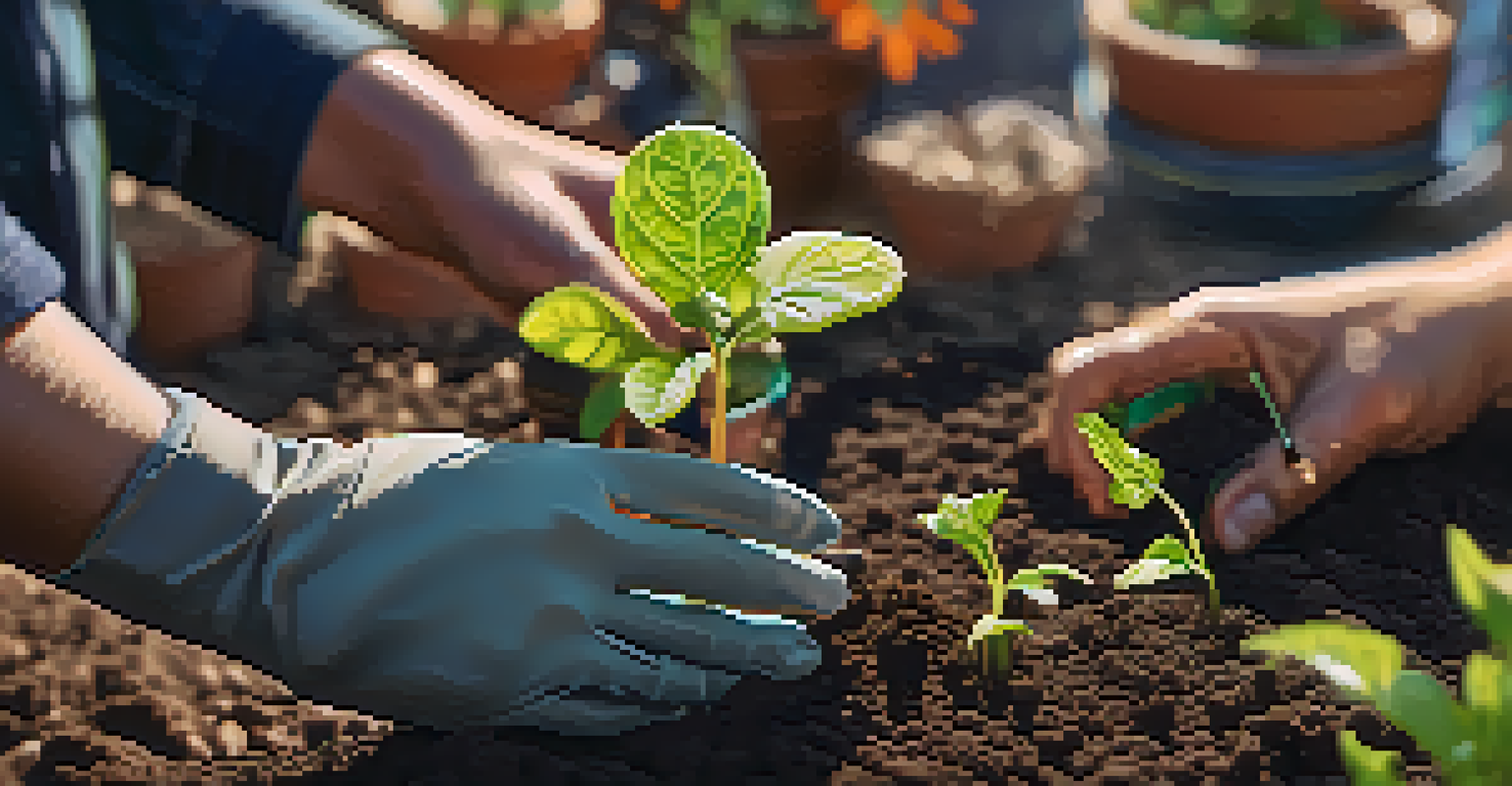Exploring Charlotte's Community Gardens: A Local Treasure

Understanding the Value of Community Gardens in Charlotte
Community gardens in Charlotte are more than just patches of green; they're vibrant spaces that foster community spirit. These gardens serve as crucial hubs where residents can connect, share resources, and grow together. For many, it's not just about the plants, but about cultivating relationships and nurturing a sense of belonging.
Community gardening creates community, not just food.
Beyond social connections, community gardens offer a sustainable way to produce fresh, local food. They encourage residents to grow their own fruits and vegetables, promoting healthier eating habits and reducing the carbon footprint associated with food transport. This local approach to food production helps combat food deserts in urban areas, making fresh produce accessible to everyone.
Additionally, these gardens contribute to environmental health by increasing biodiversity and providing habitats for various species. They serve as green lungs for the city, improving air quality and offering a respite from urban noise and heat. In essence, Charlotte's community gardens are vital for both ecological sustainability and community well-being.
A Brief History of Community Gardens in Charlotte
The history of community gardens in Charlotte dates back to the early 20th century, reflecting a growing interest in urban agriculture. Initially, these gardens emerged as a response to food shortages and economic challenges, providing residents with a means to grow their own sustenance. Over the decades, they have evolved into essential community resources, promoting food security and social equity.

In the 1970s and 1980s, the trend of community gardening gained momentum, as local communities recognized the importance of green spaces in urban areas. Residents began to band together to transform vacant lots into productive gardens, establishing a legacy that continues today. This grassroots movement not only beautified neighborhoods but also empowered residents to take control of their food sources.
Community Gardens Foster Connection
Charlotte's community gardens serve as vital spaces for residents to build relationships and a sense of belonging.
Today, Charlotte boasts a diverse array of community gardens, each with its own unique story and mission. From urban farms to educational gardens, these spaces reflect the city’s commitment to sustainability and inclusivity. As they flourish, they remind us of the rich history of community gardening and its importance in shaping a healthier, more connected city.
Key Community Gardens to Visit in Charlotte
Charlotte is home to several noteworthy community gardens that showcase the city’s commitment to urban agriculture. One standout is the Charlotte Community Garden at the corner of Park Road and Tyvola Road, known for its diverse plantings and active volunteer base. Visitors often find a warm welcome and a chance to learn from experienced gardeners about growing techniques and seasonal crops.
The best way to predict the future is to create it.
Another gem is the Community Garden at the Charlotte Regional Farmers Market, where local growers cultivate a variety of vegetables and herbs. This garden not only supplies fresh produce to the market but also serves as an educational site for workshops on sustainable gardening practices. It’s a great place for both seasoned gardeners and novices to gain hands-on experience.
For those interested in a more tranquil experience, the Garden at the Charlotte Nature Museum offers a serene environment filled with native plants and wildlife. This garden emphasizes native species and encourages visitors to appreciate the natural beauty of the region. Each of these gardens contributes to the overall tapestry of community gardening in Charlotte, making them well worth a visit.
Community Involvement: How to Get Involved
Getting involved in Charlotte's community gardens is easier than you might think. Many gardens welcome volunteers for planting, maintenance, and educational events, allowing you to meet new people while getting your hands dirty. Whether you have a green thumb or are just curious about gardening, there's a place for you.
You can also participate in community workshops and events that many gardens host throughout the year. These gatherings often focus on specific gardening techniques, cooking demonstrations, or seasonal celebrations, providing opportunities to learn and engage with fellow community members. By attending these events, you’ll not only enhance your gardening skills but also strengthen your connection to the community.
Gardens Promote Sustainable Practices
These gardens enhance urban biodiversity and implement eco-friendly practices, contributing to environmental health.
If you're interested in starting your own community garden, connect with local organizations that support this initiative. Groups like the Charlotte Community Gardening Coalition can provide resources, guidance, and even funding to help you get started. With a little effort and enthusiasm, you can contribute to the growth of community gardening in Charlotte.
The Environmental Benefits of Community Gardens
Community gardens play a crucial role in enhancing urban biodiversity. They provide habitats for various pollinators and beneficial insects, contributing to the overall health of the ecosystem. This biodiversity is essential for maintaining robust food production systems and ensuring the resilience of our urban environments.
Moreover, these gardens help mitigate the urban heat island effect by cooling the surrounding areas. The greenery not only beautifies the city but also absorbs carbon dioxide and releases oxygen, improving air quality for everyone. This natural cooling system can significantly impact local weather patterns and enhance the livability of our neighborhoods.
Lastly, community gardens often implement sustainable practices like composting and rainwater harvesting. These practices reduce waste and promote efficient water usage, showcasing how simple actions can lead to substantial environmental benefits. By participating in or supporting community gardens, you’re part of a larger movement toward environmental stewardship in Charlotte.
Health Benefits of Gardening in the Community
Gardening offers a myriad of health benefits, both physical and mental. Engaging in gardening activities provides a great workout, helping to improve cardiovascular health, strength, and flexibility. The act of digging, planting, and harvesting can burn calories and promote overall fitness, making it a fun way to stay active.
In addition to physical health, gardening has been shown to reduce stress and improve mental well-being. Spending time in nature and nurturing plants can have a calming effect, allowing individuals to escape the hustle and bustle of city life. Many find joy and fulfillment in watching their plants grow, creating a sense of accomplishment and purpose.
Health Benefits of Community Gardening
Engaging in gardening activities not only boosts physical fitness but also improves mental well-being through social interaction.
Furthermore, community gardens foster social interaction, which is essential for mental health. By working alongside others and sharing experiences, individuals build friendships and support networks. This sense of belonging and community can significantly enhance overall happiness and life satisfaction.
Future of Community Gardens in Charlotte
The future of community gardens in Charlotte looks bright as more residents recognize their value. With a growing interest in sustainable living and local food production, these gardens are likely to expand in both number and diversity. Initiatives to promote urban agriculture are gaining traction, paving the way for new community gardening projects.
As urban development continues, the challenge will be to preserve and protect existing garden spaces. Advocacy for community gardens is essential to ensure they remain a part of Charlotte's landscape. By engaging local government and organizations, residents can work together to secure funding and support for these vital green spaces.

Looking ahead, Charlotte's community gardens may also evolve to incorporate new technologies, such as vertical gardening and hydroponics. These innovations could enhance productivity and sustainability, making gardening more accessible to urban residents. The future holds exciting possibilities for community gardens, ensuring they remain a treasured part of Charlotte’s fabric.